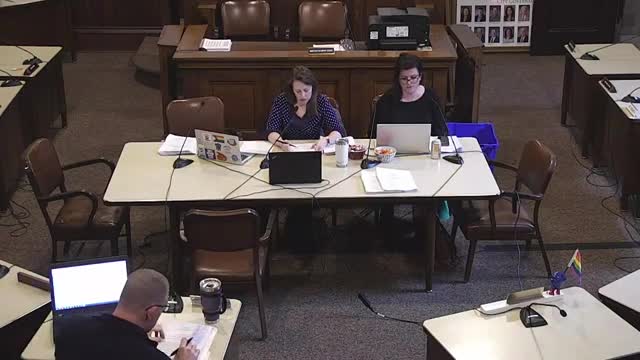Charter rules committee advances recall measure to full council for Nov. 2025 ballot
Get AI-powered insights, summaries, and transcripts
Subscribe
Summary
A Holyoke City Council committee voted to send a proposal for a special act recalling four‑year elected officials to the full council with a recommendation after debate over signature thresholds and election costs.
The Charter Rules Committee voted April 2 to send to the full City Council a proposed special-act charter amendment that would allow voters to pursue recall elections for some four‑year city officials, with the question to be placed on the November 2025 ballot if subsequent steps are approved.
The measure, filed Feb. 4 by Councilors Jordan and Bacon and presented to the committee as a reintroduction of language the council approved in 2017, would create a recall petition and election process for the mayor and city clerk (the treasurer had been removed from consideration earlier in the discussion). "This is a rehash of an item that the Council had adopted back in 2017," said Councilor Jardine during the committee discussion.
The proposal would use a relatively high signature threshold to trigger a recall election. Committee members discussed using a fixed signature count versus a percentage of registered or recent voters; Committee Chair Meg McGrath Smith said the city clerk had advised that any election would cost roughly $20,000 to $30,000 and urged the committee to balance a signature threshold against that fiscal impact. McGrath Smith noted one option: a percentage of voters who cast ballots in the most recent state election, which would reduce the numerical threshold in years with lower turnout.
Councilor Linda Bacon said she supported a high bar to prompt a recall but said voters should have a remedy in exceptional circumstances, recounting a past treasurer who accepted a full‑time private job while holding office and prompting council action at the time. "We all serve at the pleasure of the voters, and it seems only fair that they should have a process," Bacon said.
Committee members debated specific thresholds: proposals mentioned in the meeting ranged from several hundred signatures to a percentage-based standard. McGrath Smith read provisions from the prior draft showing a requirement that a petition be returned within 30 days signed by at least 10% of the total number of registered voters (the text in the packet included that 10% threshold). Members asked the clerk’s office for turnout and registration data so they could set a threshold that would reflect community expectations without allowing a small group to trigger an expensive special election.
The committee voted to move the measure to the full council with a recommendation for adoption; the committee announced the policy recommendation and recorded affirming voice votes. During the roll-call portion of related business the committee recorded Councilor Bacon, Councilor McGrath Smith and Councilor Murphy Ramboletti as voting in favor of moving the item to the council.
If the full council and the mayor approve the measure, the proposal would proceed as a home‑rule petition to the Massachusetts Legislature; the legislature would have to act before the item could be placed on a local ballot for voter approval.
The committee did not finalize exact signature or turnout thresholds; members asked the clerk to supply recent turnout and registration numbers so the full council can set a specific standard in later proceedings.
The committee’s action is procedural only: final adoption would require votes by the full council, the mayor (to permit a home‑rule petition to go forward), legislative approval and then voter approval at the ballot box. The item will be on a future full council agenda for further debate and a possible vote.
